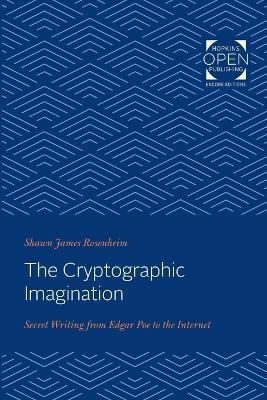
The Cryptographic Imagination
Secret Writing from Edgar Poe to the Internet
Seiten
2020
Johns Hopkins University Press (Verlag)
978-1-4214-3715-6 (ISBN)
Johns Hopkins University Press (Verlag)
978-1-4214-3715-6 (ISBN)
Originally published in 1996. In The Cryptographic Imagination, Shawn Rosenheim uses the writings of Edgar Allan Poe to pose a set of questions pertaining to literary genre, cultural modernity, and technology. Rosenheim argues that Poe's cryptographic writing—his essays on cryptography and the short stories that grew out of them—requires that we rethink the relation of poststructural criticism to Poe's texts and, more generally, reconsider the relation of literature to communication. Cryptography serves not only as a template for the language, character, and themes of much of Poe's late fiction (including his creation, the detective story) but also as a "secret history" of literary modernity itself. "Both postwar fiction and literary criticism," the author writes, "are deeply indebted to the rise of cryptography in World War II."
Still more surprising, in Rosenheim's view, Poe is not merely a source for such literary instances of cryptography as the codes in Conan Doyle's "The Dancing-Men" or in Jules Verne, but, through his effect on real cryptographers, Poe's writing influenced the outcome of World War II and the development of the Cold War. However unlikely such ideas sound, The Cryptographic Imagination offers compelling evidence that Poe's cryptographic writing clarifies one important avenue by which the twentieth century called itself into being.
"The strength of Rosenheim's work extends to a revisionistic understanding of the entirety of literary history (as a repression of cryptography) and then, in a breathtaking shift of register, interlinks Poe's exercises in cryptography with the hyperreality of the CIA, the Cold War, and the Internet. What enables this extensive range of applications is the stipulated tension Rosenheim discerns in the relationship between the forms of the literary imagination and the condition of its mode of production. Cryptography, in this account, names the technology of literary production—the diacritical relationship between decoding and encoding—that the literary imagination dissimulates as hieroglyphics—the hermeneutic relationship between a sign and its content."—Donald E. Pease, Dartmouth College
Still more surprising, in Rosenheim's view, Poe is not merely a source for such literary instances of cryptography as the codes in Conan Doyle's "The Dancing-Men" or in Jules Verne, but, through his effect on real cryptographers, Poe's writing influenced the outcome of World War II and the development of the Cold War. However unlikely such ideas sound, The Cryptographic Imagination offers compelling evidence that Poe's cryptographic writing clarifies one important avenue by which the twentieth century called itself into being.
"The strength of Rosenheim's work extends to a revisionistic understanding of the entirety of literary history (as a repression of cryptography) and then, in a breathtaking shift of register, interlinks Poe's exercises in cryptography with the hyperreality of the CIA, the Cold War, and the Internet. What enables this extensive range of applications is the stipulated tension Rosenheim discerns in the relationship between the forms of the literary imagination and the condition of its mode of production. Cryptography, in this account, names the technology of literary production—the diacritical relationship between decoding and encoding—that the literary imagination dissimulates as hieroglyphics—the hermeneutic relationship between a sign and its content."—Donald E. Pease, Dartmouth College
Shawn Rosenheim is associate professor of English and American Studies at Williams College.
Acknowledgments
Introduction
Part I: Genres
Chapter 1: The King of Secret Readers
Chapter 2: Secret Writing as Alchemy: Recoding Defoe
Chapter 3: Detective Fiction and the Analytic Sublime
Chapter 4: Dark Fiber: Cryptography, Telegraphy, Science Fiction
Part 2: Effects
Chapter 5: Resurrexi: Poe in the Crypt of Lizzie Doten
Chapter 6: Deciphering the Cold War: Toward a Literary History of Espionage
Chapter 7: Ciphering the Net
Coda: Strange Loops and Talking Birds
Appendix: Public-Key Cryptography
Notes
Glossary
Index
| Erscheinungsdatum | 26.03.2020 |
|---|---|
| Reihe/Serie | Parallax: Re-visions of Culture and Society |
| Zusatzinfo | 19 Illustrations, black and white |
| Verlagsort | Baltimore, MD |
| Sprache | englisch |
| Maße | 152 x 229 mm |
| Gewicht | 372 g |
| Themenwelt | Geisteswissenschaften ► Sprach- / Literaturwissenschaft ► Anglistik / Amerikanistik |
| Geisteswissenschaften ► Sprach- / Literaturwissenschaft ► Literaturwissenschaft | |
| ISBN-10 | 1-4214-3715-5 / 1421437155 |
| ISBN-13 | 978-1-4214-3715-6 / 9781421437156 |
| Zustand | Neuware |
| Haben Sie eine Frage zum Produkt? |
Mehr entdecken
aus dem Bereich
aus dem Bereich
Poetik eines sozialen Urteils
Buch | Hardcover (2023)
De Gruyter (Verlag)
59,95 €
Buch | Softcover (2024)
belleville (Verlag)
20,00 €


